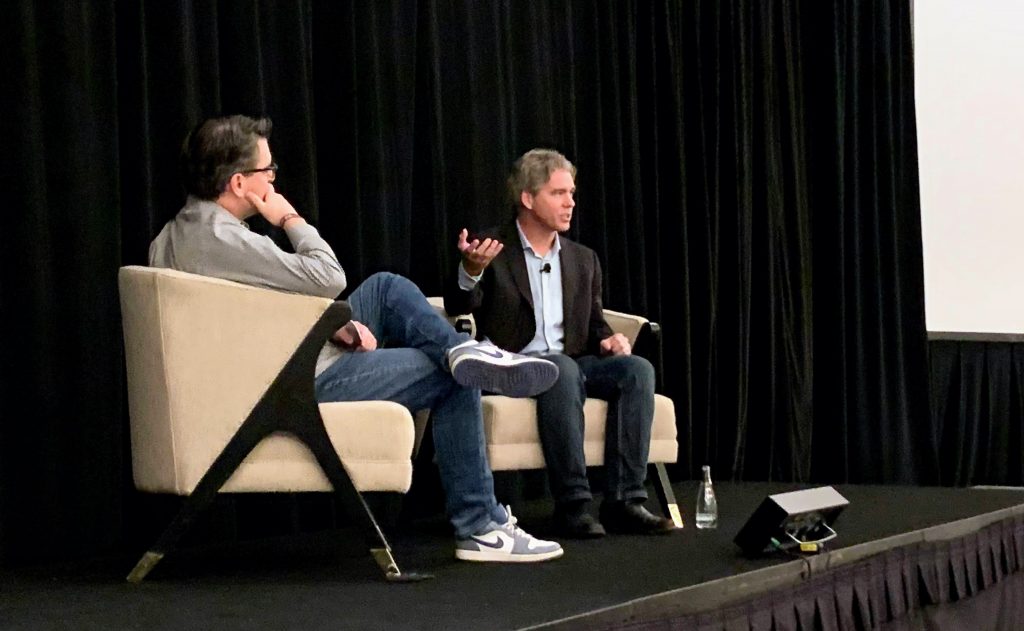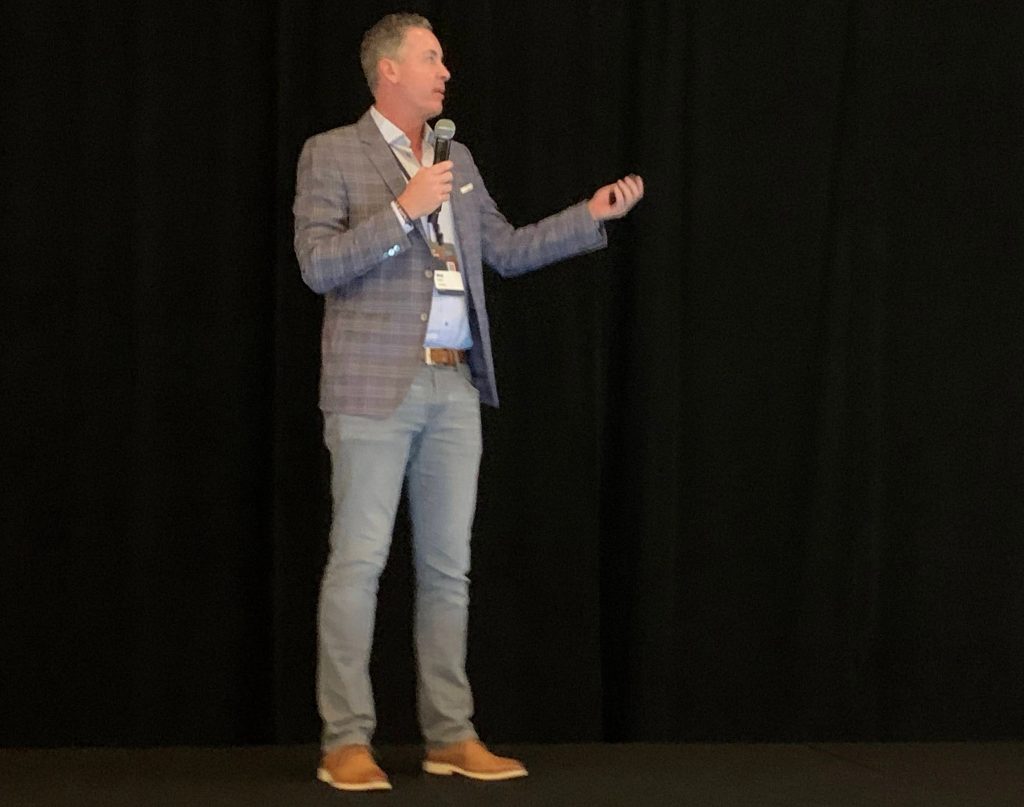There in the bar, it suddenly struck me that I was in a moment that summed up the very essence of what made this conference so unique.
It was nearly 11 p.m. on the second night of the TLTF Summit outside Miami. A group of us were in the hotel bar, stridently debating whether an alternative business structure, licensed under Arizona’s liberalized legal regulatory scheme, could deliver legal services in other states. Those engaged in the debate included a leading authority on ABS licensing in the U.K., the managing director of an Arizona ABS law firm, a veteran legal tech executive and thought leader, and the leader of an innovation program at a major law school.
It was a moment, I realized in the midst of it all, where the mix of people and the depth of their knowledge and the strength of their convictions had come together in a way that rarely does at legal technology conferences, but that was, by all accounts, par for the course at this conference.
Two days earlier, at the opening of the conference, organizer Zach Posner (pictured above) seemed to conjure the spirit of Abbie Hoffman’s “Steal this Book” when he urged attendees to “skip a session, skip every single session.” Instead, he said, “Take a walk with somebody.” Citing a concept conceived by business author Jim Collins, Posner said, “Our goal is to make ‘who luck’ happen.”
Could they Do It Again?
This was the second year of the TLTF Summit, an invite-only program focused on the future of legal tech, organized by The LegalTech Fund, the first venture capital firm to focus exclusively on legal tech, and conducted under Chatham House rules, meaning participants could use information they heard at the conference, but they could not attribute it to anyone specific.
After attending last year’s summit, I described it as having felt like the legal tech world’s answer to those invite-only summits – such as the Davos meeting of the World Economic Forum or a Renaissance Weekend – that bring together leaders from across disciplines to engage in open and unfettered dialogue.
“It was a superlative conference – one like no other conference in legal tech,” I wrote last year, predicting that getting tickets for this year’s summit would “likely be the legal tech equivalent of a Taylor Swift ticket.”
Sure, but could they do it again?
I’ll admit, coming into this year’s summit, I was somewhat dubious that it would recapture the spirit of last year’s. After all, this year’s summit nearly doubled in size, from fewer than 250 attendees last year to somewhere around 450 this year – a threat to the intimacy that was a hallmark of the first year.
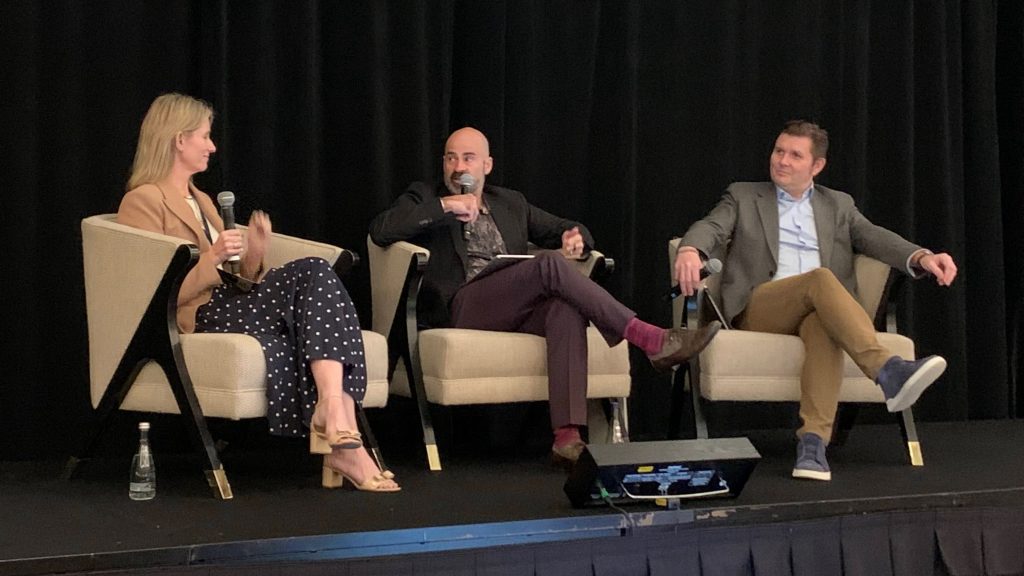
The intersection of fintech and legal tech, with Dru Armstrong, CEO of Affinipay, Tom Brown, partner and general counsel, NYCA Partners, and Mark Dorman, CEO of Elite.
On top of that, the conference moved out of downtown Miami north to the sprawling campus of the JW Marriott Miami Turnberry Resort & Spa in Aventura, a resort with a golf course, water park, spa, and more. Posner told me that the choice was deliberate, because he literally wanted attendees to get out and take walks and find private time to talk. The hotel and its grounds reminded him of the California campus of Stanford, he said.
Yet, despite the larger attendance and the more-sprawling venue, this year two of the summit managed to recapture and perhaps even build on the spirt of year one.
Unique Mix of Attendees
The overarching reason this summit is so special is the attendees. There is no other conference in legal tech that brings together a similar mix of startup founders, established company leaders, VCs and other investors, academics, and innovation leaders from law firms and corporate legal.
Such was the mix of people in attendance at this summit that, had a giant Florida sinkhole suddenly opened under the J.W. Marriott and swallowed up everyone there, it would have been a dramatic setback for legal innovation. The roster of attendees was quite literally a who’s who of some of the biggest names in legal tech, alongside some of the most promising emerging startups and behind-the-scenes investors who help fuel the future of legal.
The participation of VCs is particularly unique. I will repeat here what I said last year. If you look hard enough, you will find investors attending every major legal tech conference. But they are typically there in stealth mode, quietly observing and no doubt taking a private meeting or two. Here, they come out of the shadows, active participants on panels and in hallway conversations. There is no other legal tech conference where this happens, even though these VCs play critical roles in the development and evolution of legal tech.
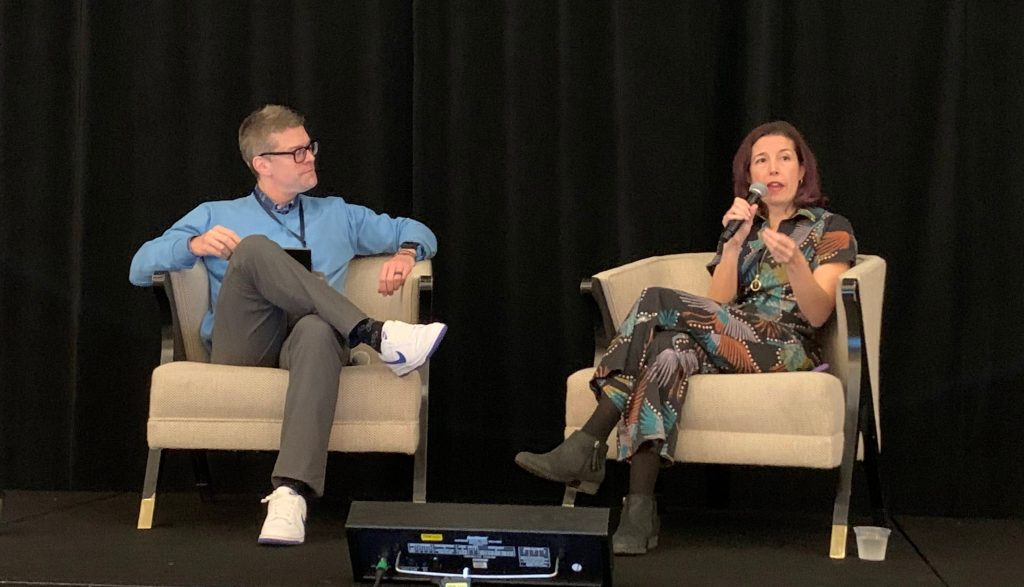
New York Times writer Kashmir Hill is interviewed by Jeff Ward about Hill’s book on facial recognition technology.
Another factor that makes this conference unique – and, again, one I also cited last year – is that it is devoid of sales. There is no exhibit hall and no one trying to get you to listen to a sales pitch. Yes, both startups and established companies were given the stage to make brief presentations about what they do, but these were presented as informative, not commercial. And, yes, I have no doubt there were deals being discussed in the hallways and walkways, but they likely involved, if anything, investments and partnerships, not one-to-one sales.
Substantive Presentations
Lest I leave the impression that the entire summit took place offstage and offline, let me set the record straight. Despite Posner’s invitation to “skip every single session,” attendees would have lost out if they took him too literally.
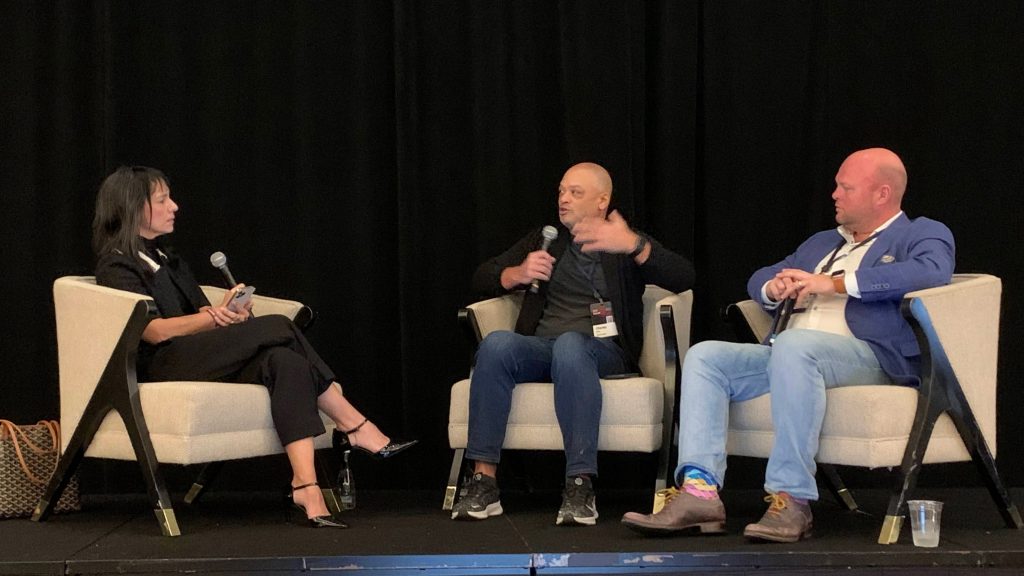
In one of two founders fireside chats, Gaby Isturiz moderated a conversation with Charley Moore, founder of RocketLawyer, and Jack Newton, founder of Clio.
The summit kicked off with a fast-paced presentation by Dan Katz, professor of law at Chicago Kent College of Law, on 11 days that defined the year in legal AI, followed by a conversation between Katz and Damien Riehl, VP, solutions champion, at vLex, on the impact of AI in legal.
The keynote program was a conversation between New York Times writer Kashmir Hill and Jeff Ward, director of the Duke Center on Law and Tech, about Hill’s book on facial recognition technology, Your Face Belongs to Us: A Secretive Startup’s Quest to End Privacy as We Know It.
Among the standout programs were two separate “founders” fireside chats:
- The first featured Brian Liu, founder and former chairman and CEO of LegalZoom and now cofounder of Overture Law, and Andrew Sieja, the founder and executive chairman of Relativity, in a conversation moderated by Haley Altman, now a strategic advisor to Litera and formerly the founder of Doxly.
- The second was with Jack Newton, founder of Clio, and Charley Moore, founder of RocketLawyer, moderated by Gaby Isturiz, general partner with The Fund XX and formerly the founder of both Bellefield, which was acquired by Aderant, and eBillingHub, which was acquired by Thomson Reuters.
Another fireside chat focused on access to justice, in a conversation between Sheena Meade, CEO of the Clean Slate Initiative, and Natalie Knowlton, founder and principal consultant at Access to Justice Ventures.
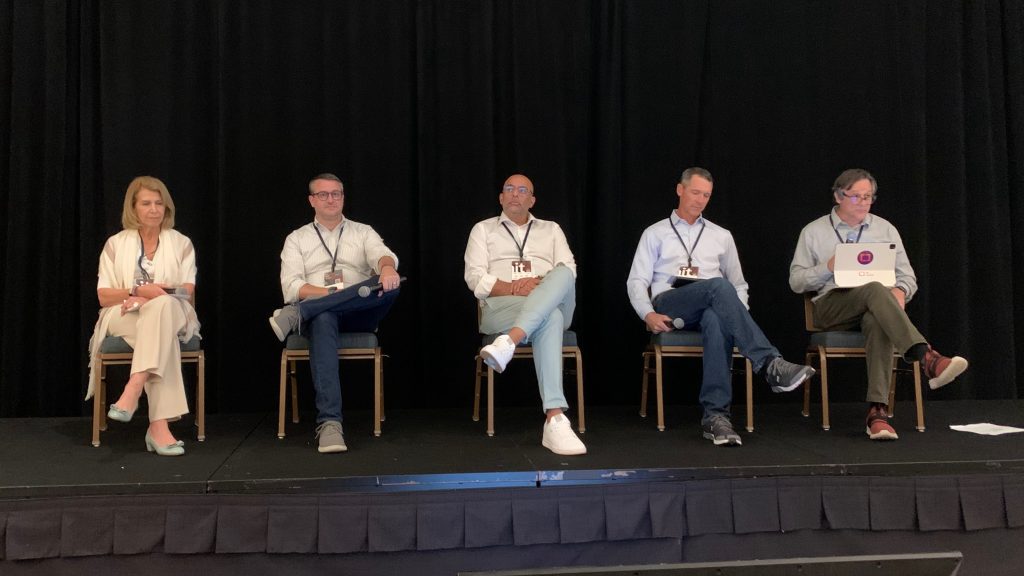
Discussing document management in the age of AI were Gina Lynch, Joe Green, Avaneesh Marwaha, Josh Baxter, and Jim Wagner.
On the main conference stage, panels covered:
- The intersection of fintech and legal tech, with Dru Armstrong, CEO of Affinipay, and Mark Dorman, CEO of Elite, moderated by Tom Brown, partner and general counsel, NYCA Partners.
- Transformative approaches to compliance and regulatory challenges moderated by Shruti Ajitsaria, head of Fuse at Allen & Overy and featuring Ashton Boon, chief risk officer at the Mayo Clinic, Alex Zerden, founder and principal at Capitol Peak Strategies, Hemma Lomax, VP and general counsel for integrity, governance, risk and compliance at Zendesk, and Steve Marsh, CEO of Archivist Capital and chairman and founder of Smarsh.
- Tech-powered litigation, featuring Darth Vaughn, managing director of legalops and litigation counsel at Ford Motor Company, Subroto Mukerji, CEO of Integreon, and Farrah Pepper, chief legal innovation counsel at Marsh McLennan, and moderated by Kevin Clem, chief growth officer at Harbor.
- Document management in the age of AI, with Gina Lynch, chief knowledge and innovation officer at Paul Weiss, Josh Baxter, CEO of NetDocuments, Avaneesh Marwaha, chairman of Litera and executive chairman of Reveal, and Joe Green, chief innovation officer at Gunderson Dettmer, moderated by Jim Wagner, cofounder and CEO of The Contract Network.
- Opportunities for law firms in a changing legal services landscape, with Ira Coleman, chair of McDermott Will & Emery, and Mitch Zuklie, chair of Orrick, Herrington & Sutcliffe, moderated by Keri Gohman, CEO of Caret.
- The impact of changes to the regulation of law practice, with James Peters, head of legal innovation at LegalZoom, Gareth Hunt, managing Director of financial institutions and legal services at Stifel, and Catherine Kemnitz, chief strategy and development officer at Axiom), moderated by Crispin Passmore, founder and managing director of Passmore Consulting.
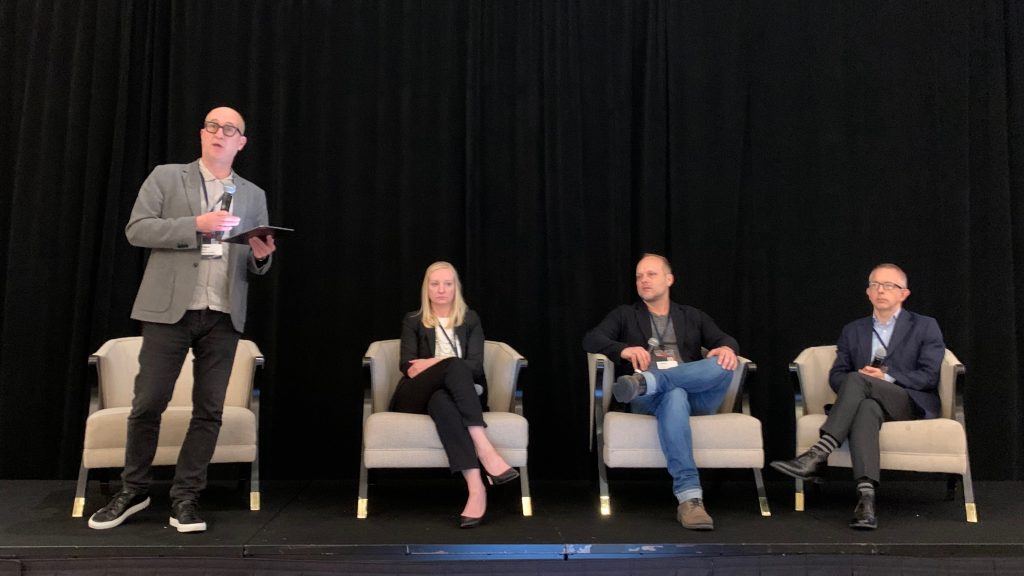
Crispin Passmore moderated a panel on regulatory changes, with Catherine Kemnitz of Axiom, James Peters of LegalZoom, and Gareth Hunt of Stifel.
Throughout the summit, a separate Startup Showcase stage featured a series of five-minute pitches from pre-seed to Series A legal tech companies. Five of the startups were selected as finalists to present on the main stage: HData, Streamline.ai, Justpoint, SimpleClosure, and NLPatent.
Twelve scale stage companies also made presentations, which were described as highlighting the next generation of expansion and growth-stage companies.
Predominant Themes
So for a conference focused on “innovators who are transforming the world of law,” what were the predominant themes?
Notably, last year’s conference took place just a week after ChatGPT first came to market. In summing up last year’s conference, I wrote, “All eyes are on generative AI.” While AI was still somewhat of a curiosity then, it was, not surprisingly, a dominant theme this year, as seemingly every legal tech product now incorporates AI and every investor, founder, and company head focuses on the future of AI.
One panel that took the AI conversation in a fascinating direction focused on the intersection of AI and document management, and in the ways that AI could potentially supplement or supplant document management systems as we know them.
Another topic that permeated the summit this year, as it also did last year, was the intersection of fintech and legal tech. As I already mentioned, there was one panel devoted to that topic, but throughout the summit, it was clear that much thought is being given to the need for legal professionals to meld the financial and technical aspects of delivering legal services.
A topic that was dominant last year but barely mentioned this year was contract lifecycle management, or contracts tech in general. While the topic certainly was not ignored, it clearly has been overshadowed by the focus on AI.
What About A2J?
I would have liked to see more attention paid to justice tech and issues surrounding access to justice. Even though the summit did include a fireside chat on access to justice, it felt a bit gratuitous, and the chat was poorly attended. There was no other programming on A2J, and none of the featured startups were in that area or in justice tech.
Rather, as might be expected at a conference put on b VCs, the focus was on – as Willie Sutton might have said – “where the money is.” And where the money is means big firms and big corporates – and therefore on tech designed to meet the needs of big firms and big corporates.
Another of those impromptu conversations I had during the summit went exactly to this point. Is there a trickle-down effect in legal tech? Does tech developed for large firm and large corporate customers eventually inure to the benefit of smaller firms, small businesses and consumers?
I think it does, at least sometimes. But developing tech for biglaw is a circuitous route to helping smaller firms and consumers. Next year, I suggest, make justice tech a central part of the conversation.
But honestly, whether they take my advice on that or not, I will be back next year, should they deign to invite me. No other conference so uniquely brings together the leading edge of legal tech, in a setting designed to foster the conversations and collaborations that will move that leading edge even farther into the future.
For me, being able to be there and be part of that felt like a moment of enormous “who luck.”
Want other perspectives on the conference? Here are other post-mortem posts I’ve seen from attendees:
- LegalTech Lowdown – TLTF 2023, by Ted Theodoropoulos, CEO of Infodash, writing, “overall it was one of the more enjoyable legal tech conference experiences I’ve had.”
- A LinkedIn post from Stepan Khzrtian, cofounder and CEO at Corpora, where he said, “Through the course of ~72 hours (with sleep barely accounting for 12), we traveled through a meticulously weaved chain of experiences, interspersed with 1:1s both pre-planned and impromptu, all revolving around a common question: how do we keep advancing the frontiers of legaltech.”
- A LinkedIn post by Steve Obenski, former chief strategy officer at Kira and now an advisor to startups, who said, “I cannot remember any 3-day period more packed with engaging and fruitful conversations with leaders in #legaltechnology.”
- A LinkedIn post by Josh Rosenzweig, senior director of digital transformation and user experience at Morgan, Lewis & Bockius, who wrote, “You can go to any other legal tech conference to learn about what law firms or service providers are doing today, but if you are interested in what’s coming next, this event stands alone.”
 Robert Ambrogi Blog
Robert Ambrogi Blog
